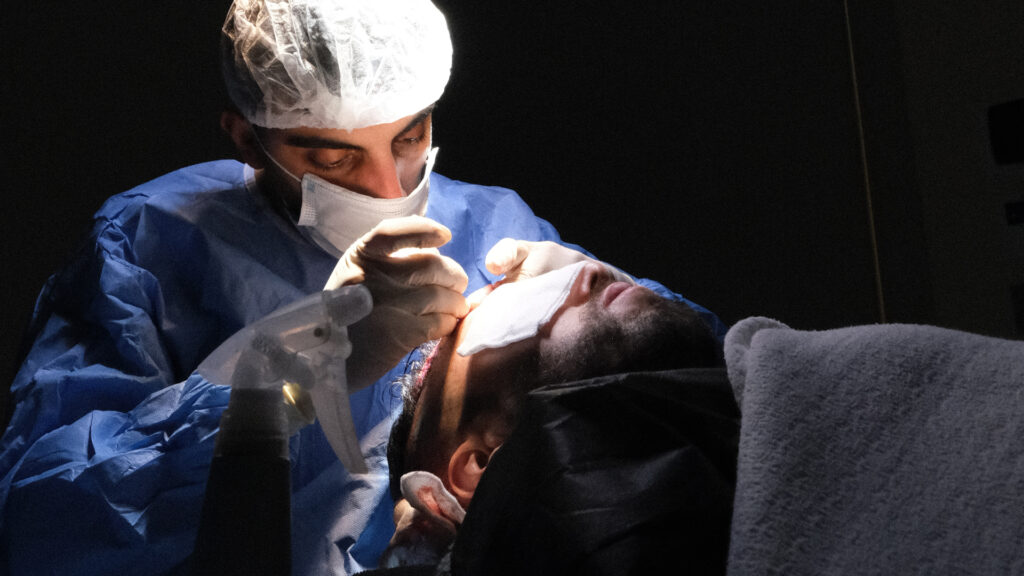What is a Sleeve Gastrectomy?
Sleeve gastrectomy, also known as calibrated vertical gastroplasty with gastric resection, is a surgical method used to address obesity by removing the lower two-thirds of the stomach. Once reduced to a tube, the stomach slows down food intake before rapidly processing it into the small intestine. While the digestion process remains unchanged, the operation lowers the ghrelin (hunger hormone) level, thus making patients feel full more quickly. It positively modifies the esophageal bacterial flora, leading to an increased preference for fish and green vegetables and decreased desire for meat and starchy foods. Unlike gastric banding or bypass, sleeve gastrectomy is irreversible: once the stomach has been reduced, the removed part cannot be restored. The procedure typically lasts about two hours and necessitates a hospital stay of 3 to 8 days. Sleeve gastrectomy is the most common bariatric surgery technique implemented in the UK, Ireland, the US, and Canada.

Who is Eligible for a Sleeve Gastrectomy?
Neither a magical diet nor a surgical solution exists to solve all weight-related issues. Regardless of the method chosen – bypass, gastrectomy, or sleeve – patients should have already attempted medical, psychotherapeutic, and nutritional treatments along with regular physical activity for 6 to 12 months without success. Their motivation must be genuine and commitment complete for substantial weight loss to occur. Sleeve gastrectomy is suitable for people with a BMI (body mass index) of 35 to 40 who suffer from obesity-related complications like high blood pressure, diabetes, sleep disorders, metabolic issues, or debilitating osteoarticular diseases. Patients must be at least 18 years old.

Why Choose Antalya for Sleeve Gastrectomy?
Affordable Surgery
In the UK, Ireland, the US, and Canada, a sleeve gastrectomy might cost between €10,000 and €15,000 in a non-accredited medical center. However, in Antalya, Turkey, clinics affiliated with Body Expert charge from €3,000, including travel costs and assistant/translator services. Thus, patients can save between 60 and 80%, making the operation much more affordable.

High-quality Medical Facilities
Antalya, the heart of the Turkish Riviera, is a major Mediterranean city with around 3 million residents. It boasts advanced medical facilities, a leading medical university, and highly skilled surgeons and medical teams specializing in bariatric surgery. These professionals cater to patients globally. The incorporation of the latest medical technologies, along with the clinics’ stringent hygiene and quality standards, ensures a safe medical stay with excellent value for money.

Continuous Support and Medical Follow-up by Body Expert
From preparing medical records and estimates to postoperative follow-up, including real-time assistance and translation services during medical appointments, Body Expert and its medical assistants provide personalized, continuous service and support for each patient.

Pros and Cons of Sleeve Gastrectomy
Advantages
- Substantial reduction in the hunger hormone production
- Decreased food intake
- Accelerated digestion and reduced absorption
- No food blockages or deficiencies as the intestinal circuit is preserved
- Simple medical monitoring
- Low operation risks
- Significant improvement in type II diabetes, hypertension, and metabolic disorders
Disadvantages
- Requires a strict diet
- Irreversible surgery
- Rare risk of fistula

How to Prepare for a Sleeve Gastrectomy in Antalya?
Candidates for sleeve gastrectomy should have already been on a diet regimen following their failed medical, nutritional, dietary, and psychotherapeutic treatments over 6 to 12 months. It’s vital not to consume any fiber at least 72 hours before the operation. Preoperative examinations and preparation for general anesthesia are also necessary. Moreover, patients must be ready for a hospital stay post-operation. A thorough consultation with an experienced and qualified surgeon is vital to discuss the risks, benefits, and personal goals, enabling the patient to approach the surgery fully informed. The surgeon should also prepare a postoperative follow-up plan to maximize the surgery’s success, including dietary, medical, and psychological support.

What to Expect Post-Sleeve Gastrectomy in Antalya?
Weight Loss after Sleeve Gastrectomy
According to studies by the French National Authority for Health (HAS), patients can expect to lose 45% to 65% of their weight two years post-operation. This equates to a weight loss of between 25 and 35 kg for an average height (1.70 m) patient with a BMI of 40 kg/m2. After five years, patients could lose up to 70% of their preoperative weight.

Post-Bariatric Surgery
Although effective, weight loss is often dramatic, leaving the body’s skin loose and stretched. Many patients thus opt for post-bariatric surgery to improve their body image. While this type of reconstructive surgery is only minimally covered by health insurance in the UK, Ireland, the US, and Canada, it’s significantly more affordable in Turkey. Areas such as the abdomen, legs, knees, arms, back, chest, and neck are tightened, with excess skin removed. Treatment for stretch marks might also be necessary, including abdominoplasty, liposuction, and face or back lifts. Most of these operations are performed under general anesthesia and require a substantial recovery period.

Adopting New Habits
Sleeve gastrectomy is not a miracle cure for excess weight. Post-operation, patients must adhere to dietary guidelines under a nutritionist’s supervision. Foods containing empty calories (fatty, sugary, processed foods, from soft drinks to fast food, sweets), alcohol, dried foods, bread, rice, pasta, fibrous fruits and vegetables, fat-rich foods, sugary and caffeinated drinks, etc., should be avoided. A strict diet, regular exercise, psychological support, and a balanced lifestyle are all essential for long-term success.
1993 vues
0 commentaires
0






Il n'y a pas de commentaires pour le moment.